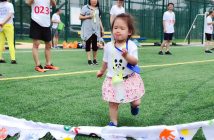The reactions to a recent article about Chinese brand of formulas stirred up thought-provoking WeChat discussions, mostly for two reasons. First, some parents actually said they’re more comfortable with Chinese brands due to Chinese standards improving remarkably over the years. Others were outraged, their contention being that the pass rate was still unacceptable from a statistical standpoint.
Surprisingly to me, though, was the second inevitable discussion about formula and breastfeeding. I should have expected this conversation though, as one commentator pointed out, “Any time there is a topic about formula, a breastfeeding debate ensues.”
And that seems to be true, especially among Western women. Women who have had blissful times of breastfeeding might not be able to help or relate to the struggles of women who just can’t for some reason. Women who formula feed, but who wanted to breastfeed, face a tremendous amount of guilt, and feel incredibly sensitive about the topic.
When I was a new mother, I cowered away from discussions among other American moms about my parenting choices, because if someone didn’t agree, they would rip my head off across the screen or in public. Formula was one of those uncomfortable topics. Remarks and judgments about how breast is best didn’t help me feel welcomed as a mother when I was already struggling. Passionate advocates of breastfeeding can sometimes hurt more feelings than help educate and raise awareness. It’s not necessarily on purpose, because often it’s just sharing of passion. I’m going to pause here to say that it’s not even the majority of passionate advocates of breastfeeding who burn others, but it’s that handful who verbally whip other women who make those who tried and “failed” afraid to speak out and share our struggles. It’s an incredibly hard issue!
The problem with this is that those who want to support breastfeeding and see to it that every mother is able to breastfeed could be at an information disadvantage. These activists need to know the problems that have faced the women who eventually chose to formula-feed. Without this knowledge, the efforts that society makes as a whole to improve breastfeeding situations for all women will continue to be shots in the dark. Often women who found themselves in my situation decide not to talk about it because of the backlash we receive.
For me, when I came to China, I saw how crappily my own country (the US) treats its mothers and babies. I realized that the situation of women like myself in my country is not normal in terms of global humanity, though problems persist around the world.
So in reflection nearly four years after my own attempts to breastfeed successfully, this is a list of reasons and possible solutions to the problems I faced while trying to breastfeed.
- Mindset and Culture
The biggest stumbling block for me as a mother was the cultural expectation of being able to do things on my own as a mom. I mean, there are women with five kids in the US who do things all on their own, or so it seems. It’s totally normal to have troubles as a new mom, but women need to voice this more often for the sake of other women. I would also encourage women to be more sympathetic of other women when they’re making choices that are different than our own, either because of preference, lack of education, or whatever. Fostering a community attitude of compassion will help more for women to raise babies and breastfeed, in comparison to passing off searing judgment. I felt so freed by Chinese women when they would say, “You care for both your children on your own? I’m so exhausted with just one!” That helped me to accept and come to terms that it is incredibly hard to be a mother. If you want to change this mindset, voice that you had struggles, and let new moms know you’ll genuinely be there for them should they need the help. - Lack of Education about Breastfeeding and More
The process of breastfeeding can be a breeze for some women, but for others, when we hit a hurdle, we don’t know what to do. I had done the research before, but not enough, clearly. I had limited access to La Leche League where I lived, so I didn’t know what to do when my daughter was clearly dehydrated and I thought I wasn’t producing enough. I was scared and panicked. I wasn’t living close to family members, and my access to affordable, timely healthcare at the time was lacking. The tradition of the yuezi and the very familial culture helped me to see that breastfeeding is best supported in a generational structure, where the yuezi nurse or the mother helps the new mom learn how to breastfeed. Without that tangible, live-in support, either electronic resources (I’m thinking videos and a breastfeeding version of WebMD symptoms checker) or more accessible healthcare need to be made available for those emergency moments. - No Parental Leave for my Husband
Living far from family meant that my main support came from my husband. The community where I lived in the US wasn’t ideal, as those who I considered friends lived far from me, about a 45 minute drive away. Calling upon them or upon others was inconvenient for them. In China, I believe most expect that their parents will help support during the newborn transitional period, though this is changing for some Chinese families. But even with this support from relatives, there is some paternal leave for fathers guaranteed by the Chinese government. Having an adult around would have made life so much clearer for me, rather than being largely on my own 8-9 hours out of the day. Baby brain fog is real, and man did it have it bad! There is plenty of research about the benefits of paternal leave. “Of the very few biological mothers interviewed whose husbands did have paid paternity leave, their partners’ ability to stay home and support them made an enormous difference” (Source: Men’s Rights).
- Medical Complications
I didn’t know until after my epidurals that the medicine can actually slow down early breastmilk production. Whoops! That would have been nice to know before I agreed to a painless labor. Women who have to have emergency C-sections might also be unprepared to know what to do if they cannot breastfeed well immediately after surgery and during recovery. (For example, donated breastmilk could be an option for women in this situation if a hygienic breastmilk bank is in the area). Of course doctors should be more open about the potential side affects of an epidural, and I have no idea why that wasn’t mentioned as a side effect when I talked to my doctor!
These are largely the issues I faced, but what about you? Did you struggle to be able to breastfeed if you wanted to and what do you think would be solutions to the hurdle you faced? Or if you struggled at first, what resources helped you?
Regrets, controversies, and wishes aside, we should all strive toward a global narrative that helps women raise their babies in the healthiest way possible, whether that’s with her own breastmilk, screened-regulated-and-donated breastmilk, or amazingly-high-standard formula. As one other netizen said, “We all do our best.”

More stories by this author here.
Email: vanessajencks@truerun.com
Twitter: @vanessa_jencks
WeChat: vanessajencks




